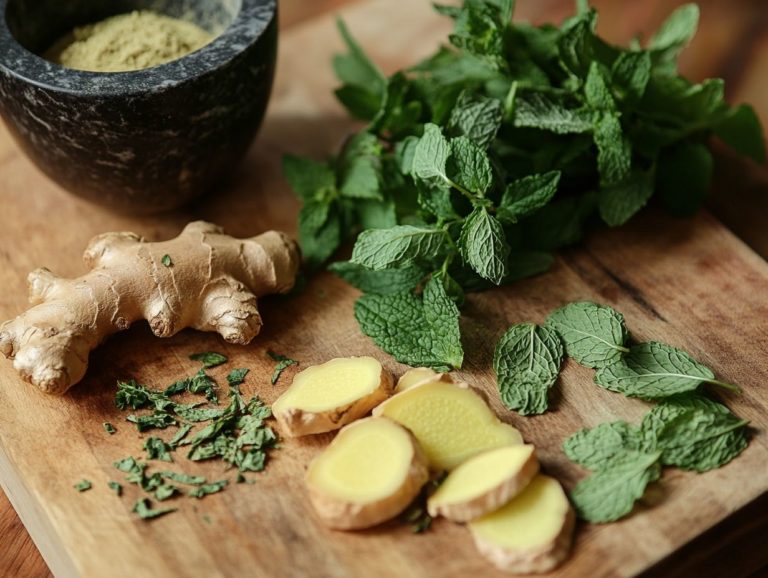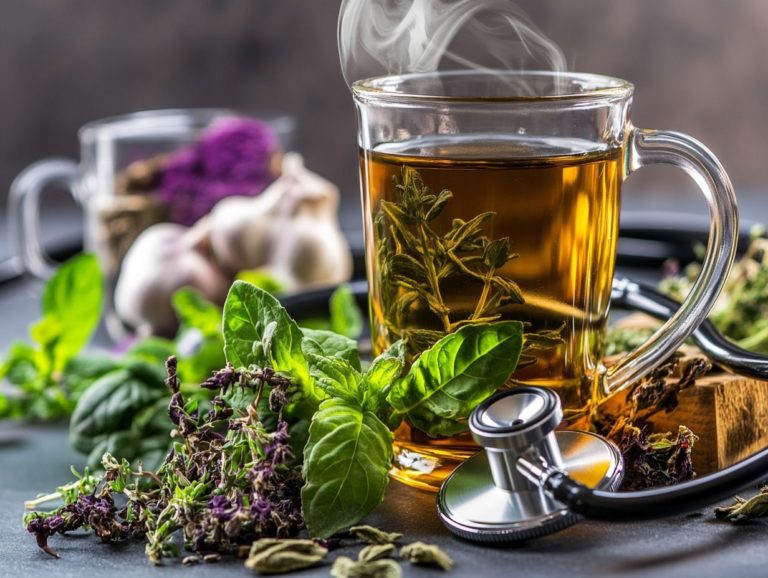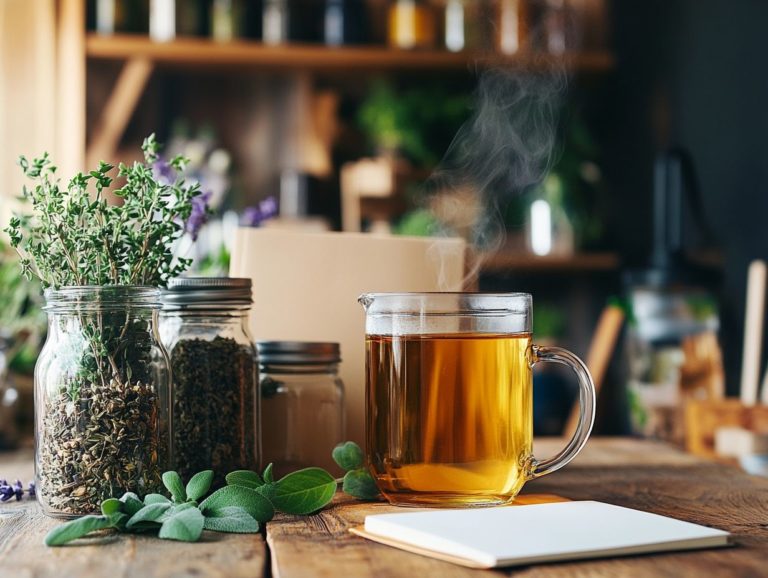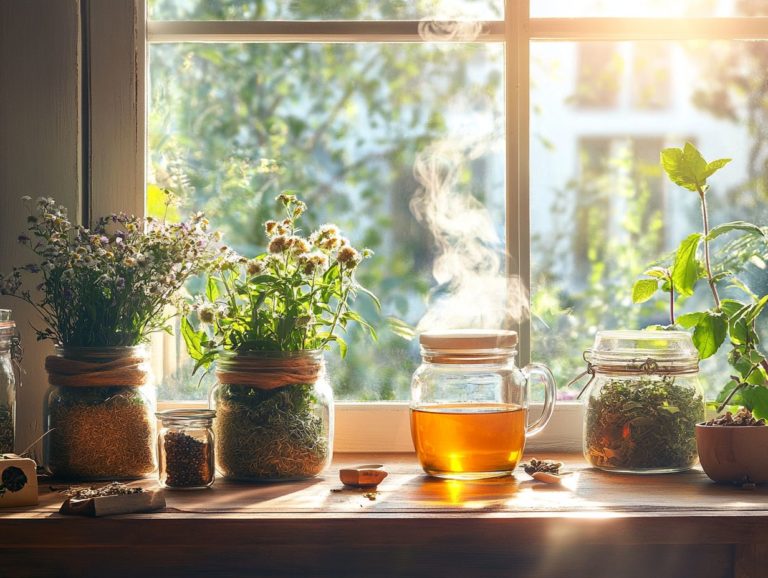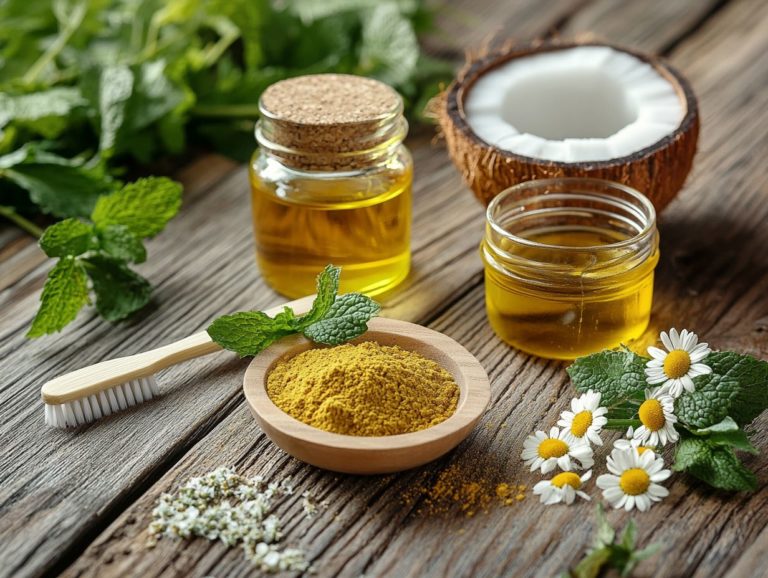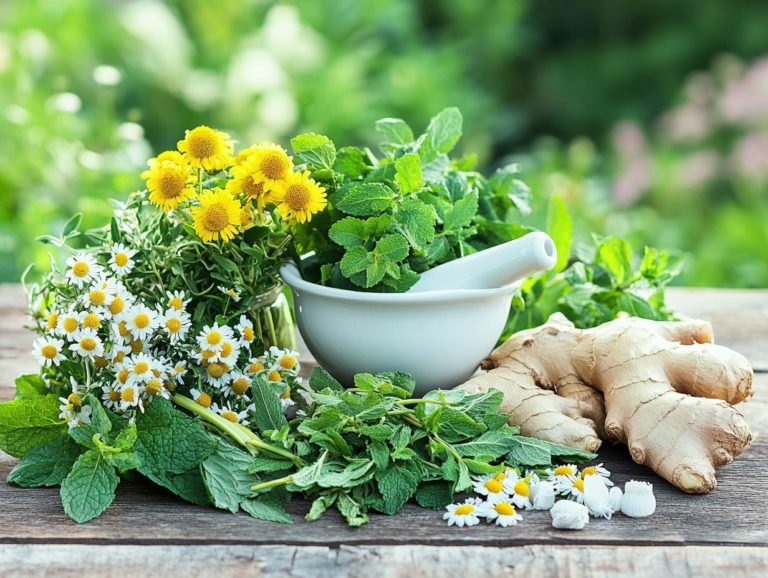5 Must-Try Herbs for Stress Management
In today’s fast-paced world, stress has become an all-too-familiar companion. Discover the powerful herbs nature offers to help you conquer stress and boost your well-being today!
This article delves into five must-try herbs Ashwagandha, Holy Basil, Rhodiola Rosea, Passionflower, and Valerian Root each celebrated for their calming properties.
You ll discover what stress really is, the myriad benefits these herbs offer, their various forms and uses, potential side effects, and practical tips for seamlessly incorporating them into your daily routine.
Explore how these natural remedies can empower you to reclaim tranquility and balance in your life.
Contents
- Key Takeaways:
- 1. Ashwagandha
- 2. Holy Basil
- 3. Rhodiola Rosea
- 4. Passionflower
- 5. Valerian Root
- What Is Stress and How Do Herbs Help with Its Management?
- Frequently Asked Questions
- What are the top 5 must-try herbs for stress management?
- How does ashwagandha help with stress management?
- What is the best way to consume holy basil for stress management?
- Can lemon balm help with both stress and anxiety?
- Is rhodiola safe to use for stress management?
- How does valerian root promote stress management?
Key Takeaways:
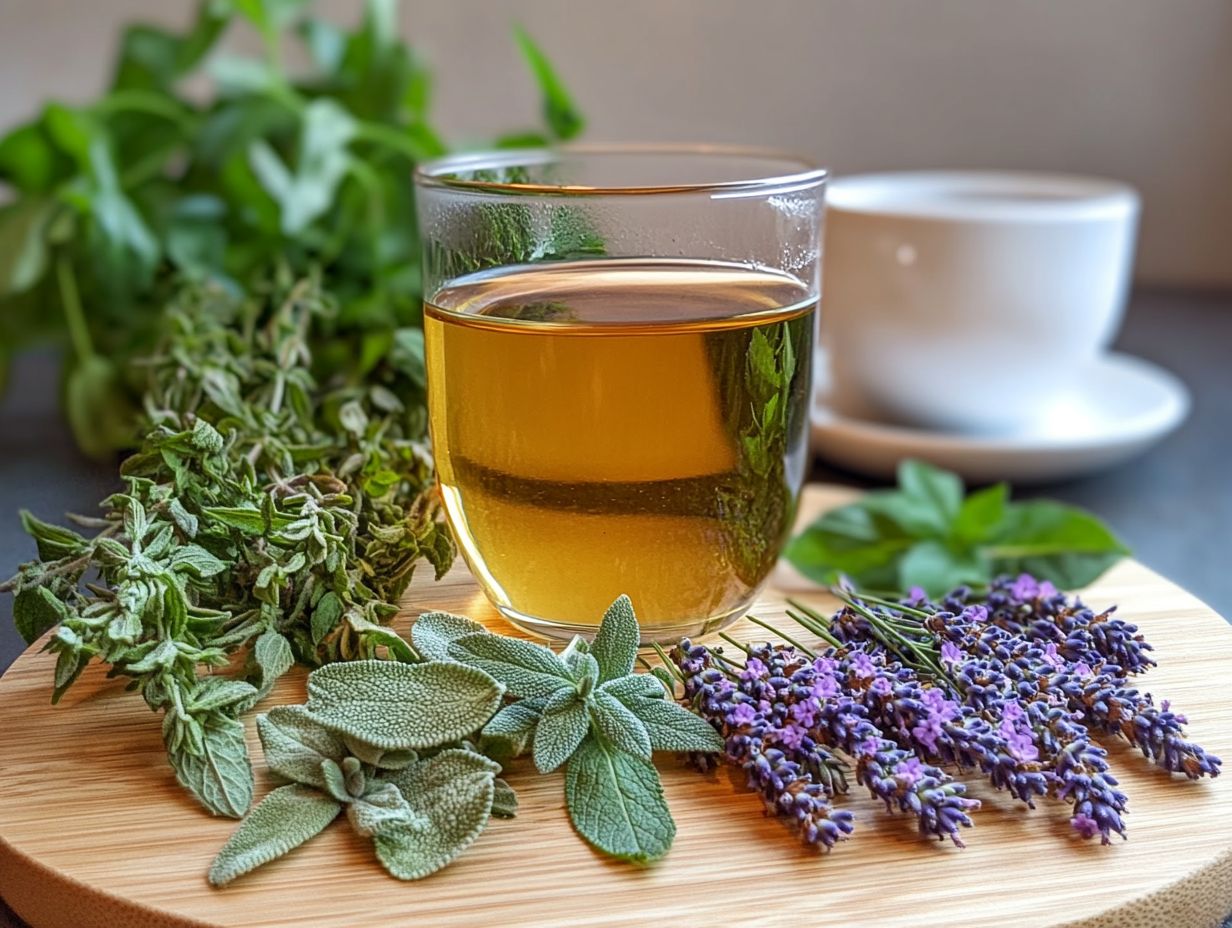
- Ashwagandha, Holy Basil, Rhodiola Rosea, Passionflower, and Valerian Root are five effective herbs for managing stress.
- These herbs have additional benefits such as improving sleep, reducing inflammation, and boosting immunity.
- These herbs can be consumed in various forms, such as tea, supplements, or tinctures, and should be used under medical supervision to avoid any potential interactions.
1. Ashwagandha
Ashwagandha, a revered adaptogen, helps modulate your stress response. It can reduce cortisol levels and provide significant anxiety relief.
This makes it an invaluable ally for anyone grappling with chronic stress and emotional disturbances. Historically, this potent herb has been a cornerstone of Ayurvedic medicine for over 3,000 years, serving not just as a remedy for stress but also as a rejuvenating tonic. For those seeking better sleep, exploring 5 must-try herbal preparations can be beneficial.
Its active compounds, especially withanolides, help your body manage stress hormones. Recent studies have shown that incorporating Ashwagandha into your routine can enhance mental clarity, improve cognitive function, and even boost physical endurance.
For instance, research published in the Journal of Alternative and Complementary Medicine revealed a significant reduction in anxiety and stress levels among participants who embraced Ashwagandha. This impressive herb is not just a traditional remedy; it offers an evidence-backed approach to manage stress and improve your overall well-being. You can also explore the top 5 DIY herbal remedies for stress relief for more natural solutions.
2. Holy Basil
Holy Basil, often dubbed ‘the elixir of life,’ stands out as a remarkable adaptogen in the realm of herbal remedies, expertly promoting emotional wellness and delivering effective stress relief for those navigating the complexities of modern existence.
This extraordinary herb has been revered in traditional medicine for centuries. It enhances resilience by aiding both the mind and body in adapting to stressors, ultimately cultivating a profound sense of calm and balance.
Its ability to lower cortisol levels, the notorious stress hormone, makes it especially advantageous for anyone grappling with anxiety, significantly boosting overall well-being.
But the benefits of Holy Basil don’t stop at stress relief. It also works to fortify the immune system, improve digestive health, and inspire emotional growth through mindfulness practices.
With various forms available teas, tinctures, and capsules you can seamlessly incorporate this versatile herb into your daily routine, transforming it into a trusted ally in your pursuit of holistic health.
3. Rhodiola Rosea
Rhodiola Rosea, a powerful adaptogen, is highly regarded for its ability to combat physical exhaustion and enhance mental performance. This makes it a sought-after option for health care professionals and anyone looking for effective anxiety relief.
Historically, this remarkable herb has been a staple in traditional medicine, particularly in regions like Siberia, where it was celebrated for boosting overall vitality and resilience.
Modern research reinforces its diverse medicinal benefits, especially its function as an immune modulator that helps your body adapt to stressors and maintain balance. Exploring its effects on the sympathetic nervous system unveils promising potential for reducing stress-induced responses and contributing to better health outcomes.
By harmonizing your body s reaction to stress, Rhodiola may play a pivotal role in enhancing both physical and mental well-being, paving the way for a more holistic approach to your health management.
Start your journey with these incredible herbs today, and take the first step towards a calmer, more balanced life!
4. Passionflower
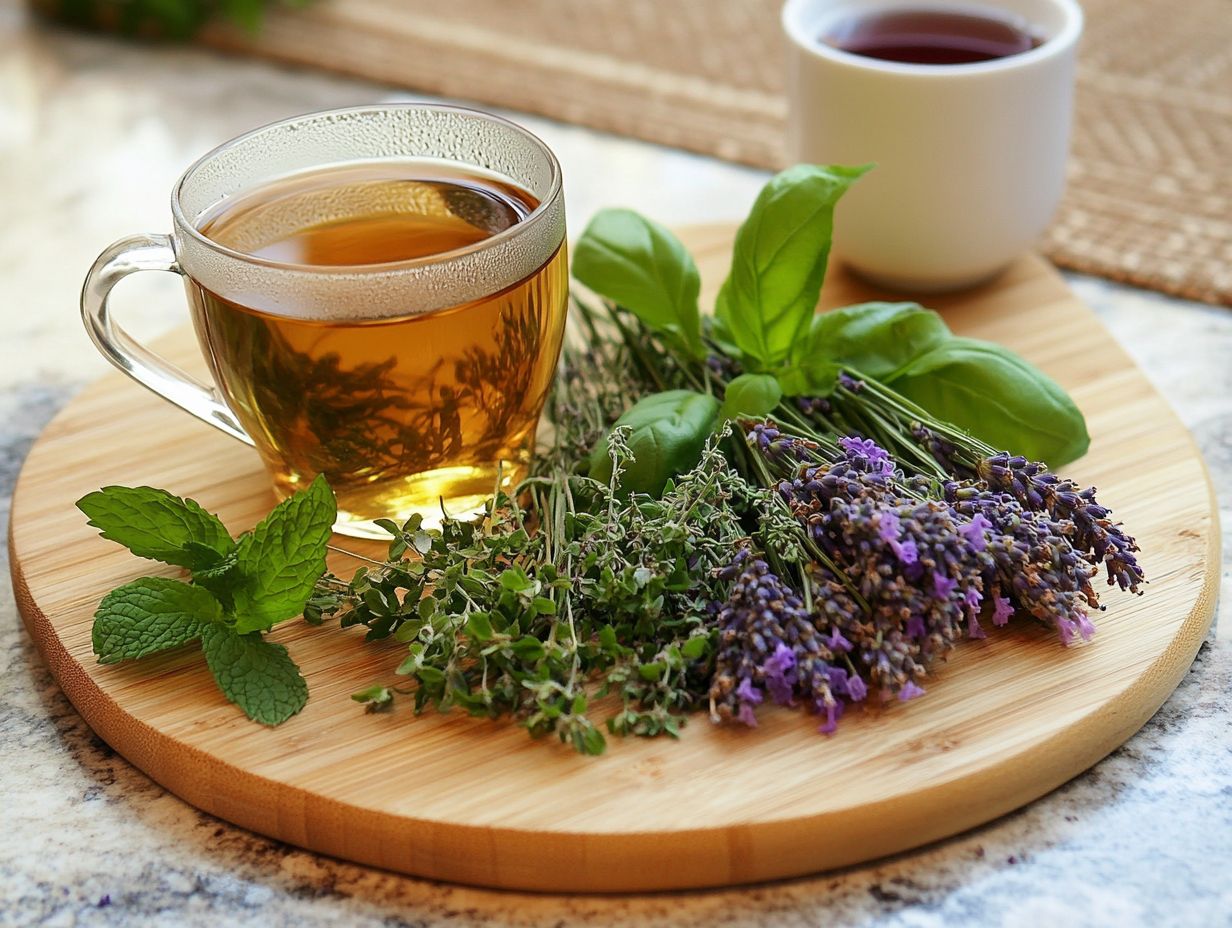
Passionflower is celebrated for its calming effects. This natural remedy can be a game-changer in your herbal treatments, effectively easing anxiety and helping you navigate emotional turmoil.
It also helps with sleep disturbances. This remarkable plant operates primarily by interacting with a brain chemical that helps you relax, promoting relaxation and reducing nervous system excitability.
You might explore various forms of passionflower whether extracts, tinctures, or teas. These have been utilized both today and throughout history, showcasing its impressive versatility. Many cultures have long recognized its potential to alleviate stress and foster emotional balance.
Such historical significance underscores its role in traditional medicine, where it’s been embraced for its soothing properties. Whether you prefer it in capsule form or brewed as a comforting tea, passionflower offers diverse health interventions designed to enhance your well-being.
5. Valerian Root
Valerian Root is a well-known herbal supplement celebrated for its impressive ability to tackle sleep disturbances and alleviate anxiety. It s a fantastic choice for those seeking natural health benefits!
This remarkable herb has roots that trace back to ancient Greece and Rome. It was cherished not just for its calming effects but also for its overall contributions to health and wellness.
Research supports the idea that Valerian Root can significantly enhance your sleep quality. It does this by increasing sleep duration and reducing the time it takes for you to drift off. This can be a game-changer if you struggle with insomnia.
Valerian Root also helps ease anxiety symptoms, offering a natural alternative to pharmaceuticals for those who prefer it. It comes in various forms teas, capsules, and tinctures with recommended dosages generally between 300 to 600 mg, ideally taken about an hour before bedtime.
Studies indicate that consistent use may lead to improved mental clarity and decreased nervous tension. This positions it as a compelling option for anyone exploring complementary therapies for their well-being.
What Is Stress and How Do Herbs Help with Its Management?
Stress is a multifaceted physiological and psychological response that can profoundly affect your overall health. It can creep in through emotional stressors, leave you feeling physically drained, and disrupt the part of your body that controls stress responses.
Understanding the different types of stress is essential for effectively tackling them:
- Chronic stress: which lingers over time and can lead to serious health concerns like cardiovascular issues and a weakened immune system.
- Emotional stress: often stemming from life events and interpersonal relationships, contributing to anxiety and feelings of depression.
Herbal medicine, especially through the use of adaptogens, offers invaluable support. Adaptogens are natural substances that help your body manage stress. Herbs like ashwagandha and rhodiola rosea work to balance cortisol levels and enhance your body s resilience to stressors.
This enables you to navigate life’s challenges with greater ease. Additionally, chamomile and lavender can promote relaxation and help alleviate the physical symptoms tied to an overstimulated nervous system.
Now is the time to explore these herbal remedies and take control of your well-being!
What Are the Other Benefits of These Herbs?
Beyond their primary role in alleviating stress, tonic herbs offer a wealth of health benefits that can elevate your emotional wellness. They can also enhance your physical capabilities and boost your immune system. These herbs are truly important parts of a holistic health care approach.
Herbs like ashwagandha and rhodiola are particularly noteworthy, as they play crucial roles in fostering emotional growth. This growth can lead to more effective stress management and greater resilience in the face of challenges. Research suggests that ashwagandha may reduce symptoms of anxiety and depression, positively impacting your mood and emotional stability. Additionally, exploring 5 common herbs with healing properties can provide further insights into natural remedies that support mental well-being.
These herbs also help improve sleep quality. Imagine enjoying deeper, restorative sleep with these incredible herbs! Many users report experiencing more restful sleep thanks to the calming effects of herbs such as valerian root.
Certain tonic herbs also provide digestive support, addressing issues like bloating or discomfort. Anecdotal evidence suggests that making these herbs a regular part of your routine may lead to notable improvements in gut health and overall well-being.
What Are the Different Forms of These Herbs and How to Use Them?
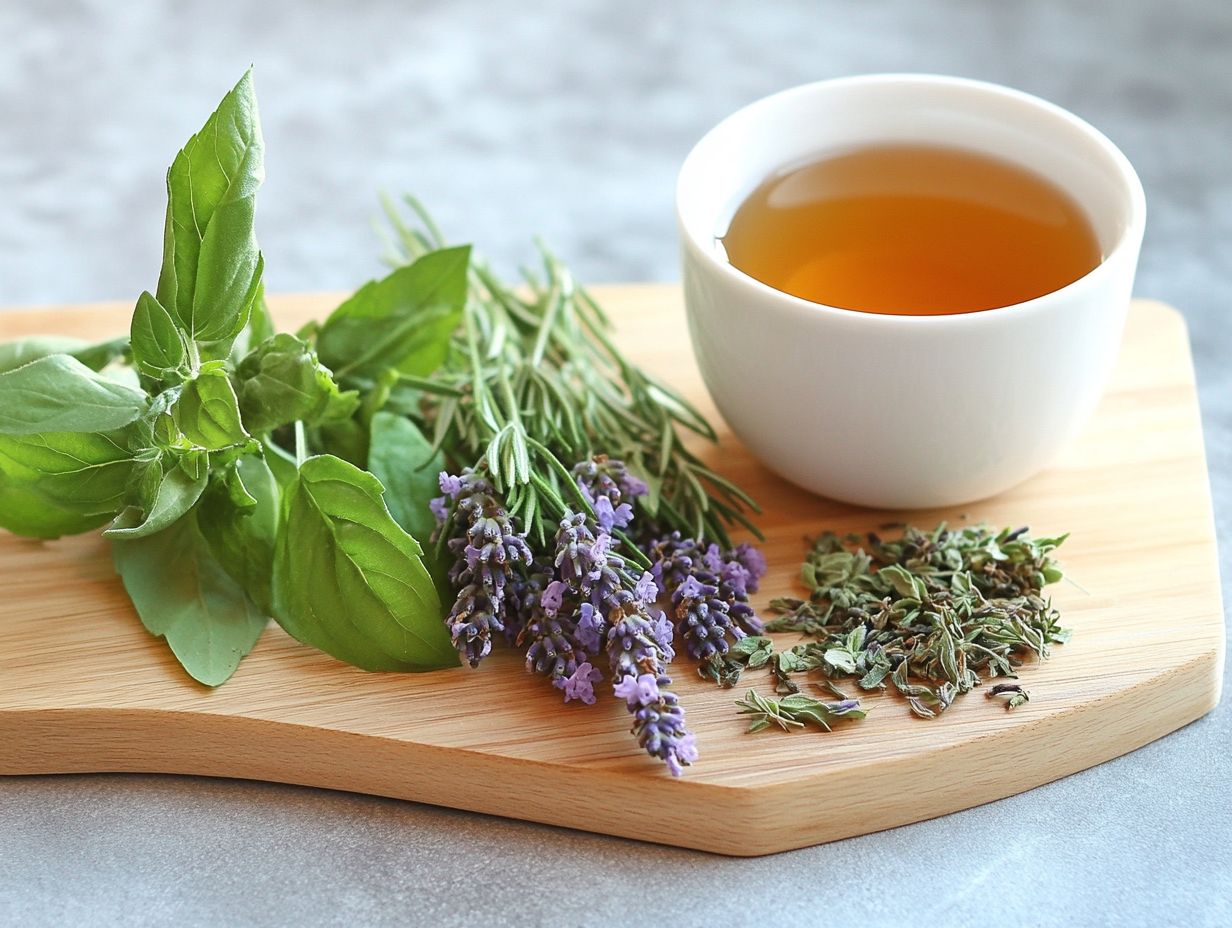
The diverse forms of these herbs teas, tinctures (liquid extracts made from herbs), capsules, and extracts offer you a flexible approach to herbal applications. This allows you to select the method that best fits your lifestyle for incorporating medicinal plants into your daily routine.
- Fresh herbs: Provide vibrant flavors and potent health properties but have a shorter shelf life.
- Dried herbs: Offer a more durable option, though their potency may wane over time.
- Tinctures: Pack a concentrated punch and deliver quick effects but may not be ideal for everyone due to their alcohol content.
- Capsules: Present a straightforward dosing solution, although they may lack the full flavor experience that some herbal enthusiasts cherish.
While recommended dosages can vary, herbal teas can generally be enjoyed several times a day. Tinctures are often suggested in smaller amounts for maximum potency. To truly reap the benefits, proper preparation methods like steeping dried herbs for the right amount of time or adhering to recommended ratios for extracts are crucial.
Are There Any Side Effects or Interactions with Other Medications?
While many herbal supplements can provide valuable health benefits, it s essential to stay informed about potential side effects and interactions with other medications, especially when it comes to treating anxiety and managing stress.
For example, St. John’s Wort might lead to photosensitivity, gastrointestinal issues, or fatigue, and can negatively interact with antidepressants, birth control, and various other medications. Valerian root, on the other hand, could cause dizziness or daytime drowsiness if not used correctly, especially when combined with sedatives.
If you’re considering adding herbal options to your routine, it s wise to consult with healthcare professionals. They can help you assess your unique health needs and medication interactions, ensuring a safe and effective approach to integrating these natural remedies into your life. Don t wait! Consult healthcare professionals before starting herbal remedies.
How Can These Herbs Be Incorporated into a Daily Routine?
Incorporating these beneficial herbs into your daily routine can elevate your wellness practices, enhance your coping strategies, and promote emotional stability. This ultimately builds resilience against the stressors of everyday life!
Think about adding herbs to your meals or teas for a tasty boost! For example, sprinkle some ashwagandha into your morning smoothie or soups to transform your meal into a calming experience. When brewing teas, let the leaves steep for at least 10 minutes to unlock their soothing properties.
Dosages can vary. Starting with around 500 mg of capsules or the equivalent amount in tea can be effective. It’s wise to consult with a healthcare provider for personalized recommendations. Combining these herbs that support healthy digestion with other stress-relieving ingredients, such as chamomile or lemon balm, can amplify their benefits, leading to a more holistic approach to your well-being.
What Are Some Additional Tips for Managing Stress Naturally?
Along with embracing herbal remedies, enhance your stress management through various natural strategies. Adopting resilience practices promotes not just emotional growth but also your overall well-being!
Consider integrating mindfulness techniques into your daily routine. These methods help center your mind and alleviate anxiety. Physical exercise, whether it s a brisk walk or a more intense workout, is vital as it releases endorphins that naturally uplift your mood.
Making dietary adjustments like adding more fruits, vegetables, and omega-3 fatty acids can have a remarkably positive effect on your mental health. Don t overlook the importance of adequate sleep; restorative rest is crucial for maintaining emotional balance!
By embracing a holistic approach that combines herbal support with these lifestyle changes, you can cultivate a more resilient and peaceful state of being.
Frequently Asked Questions
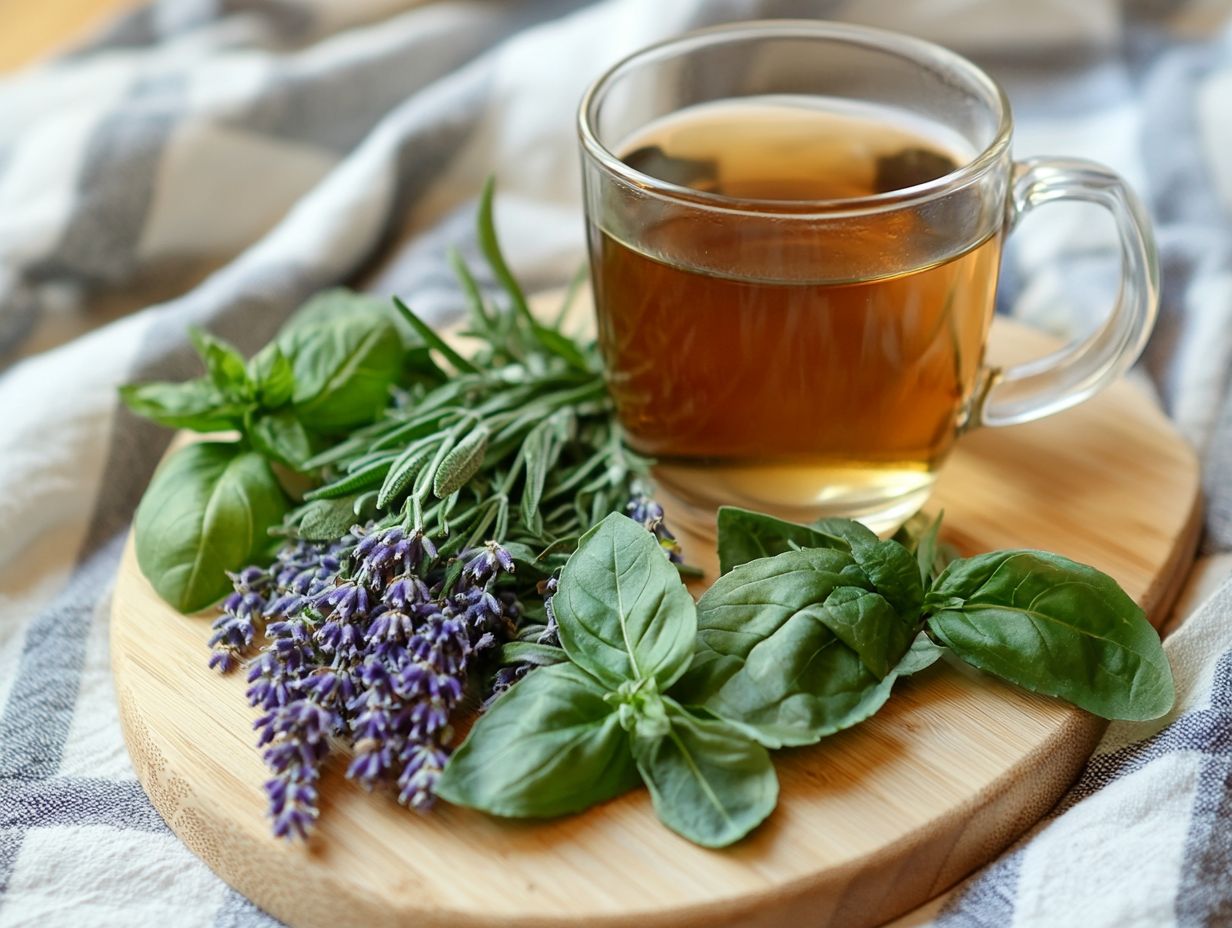
What are the top 5 must-try herbs for stress management?
The top 5 must-try herbs for stress management are ashwagandha, holy basil, lemon balm, rhodiola, and valerian root. These herbs have been used for centuries to promote relaxation and reduce stress levels!
How does ashwagandha help with stress management?
Ashwagandha is an adaptogenic herb that helps the body adapt to stress and promotes a sense of calmness. It also has anti-inflammatory properties that can reduce the physical effects of stress on the body.
What is the best way to consume holy basil for stress management?
Holy basil can be consumed in various forms, such as tea, tincture, or supplement. Drinking holy basil tea is a popular and effective way to help manage stress and promote relaxation!
Can lemon balm help with both stress and anxiety?
Yes, lemon balm is known for its ability to reduce stress and anxiety symptoms. It has a calming effect on the nervous system and can also improve mood and promote better sleep.
Is rhodiola safe to use for stress management?
Rhodiola is generally safe to use for stress management, but it’s always best to consult with a healthcare professional before adding it to your routine. It may interact with certain medications, so it’s important to discuss any potential risks.
How does valerian root promote stress management?
Valerian root has a calming effect on the nervous system and can help promote relaxation and improve sleep. It can also reduce feelings of anxiety and tension, making it an effective herb for stress management!
Don t wait! Start adding these herbs to your routine today for immediate benefits!

